倒装句 课件(共27张PPT) -2026届高三英语二轮复习专项
文档属性
| 名称 | 倒装句 课件(共27张PPT) -2026届高三英语二轮复习专项 |  | |
| 格式 | pptx | ||
| 文件大小 | 1.4MB | ||
| 资源类型 | 教案 | ||
| 版本资源 | 通用版 | ||
| 科目 | 英语 | ||
| 更新时间 | 2025-06-12 10:54:27 | ||
图片预览


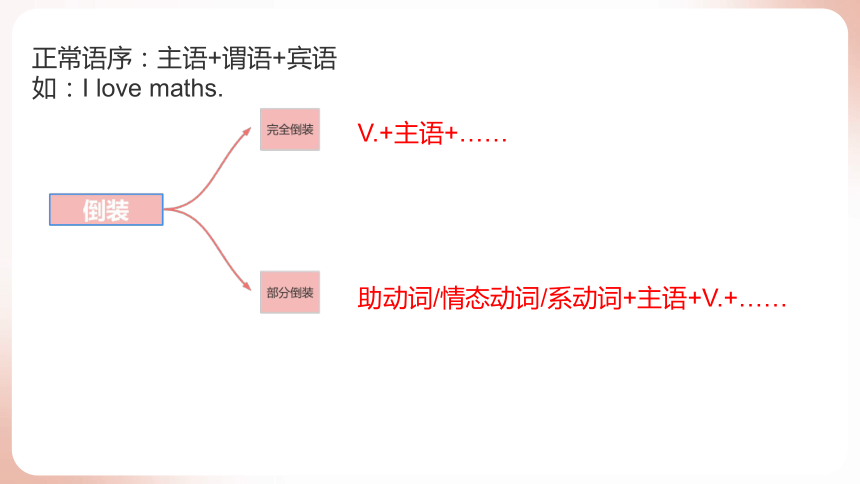
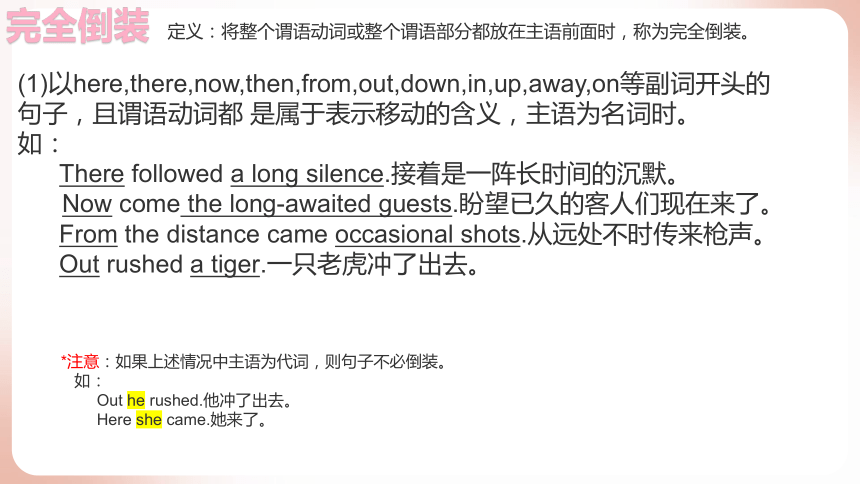
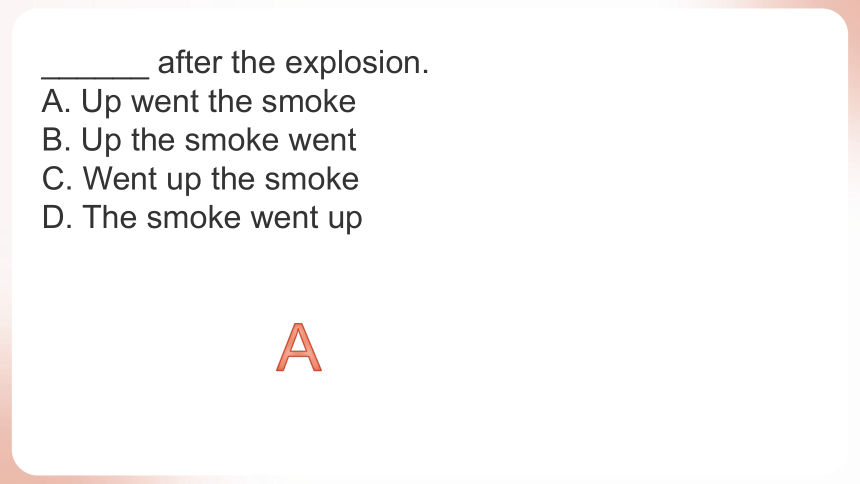
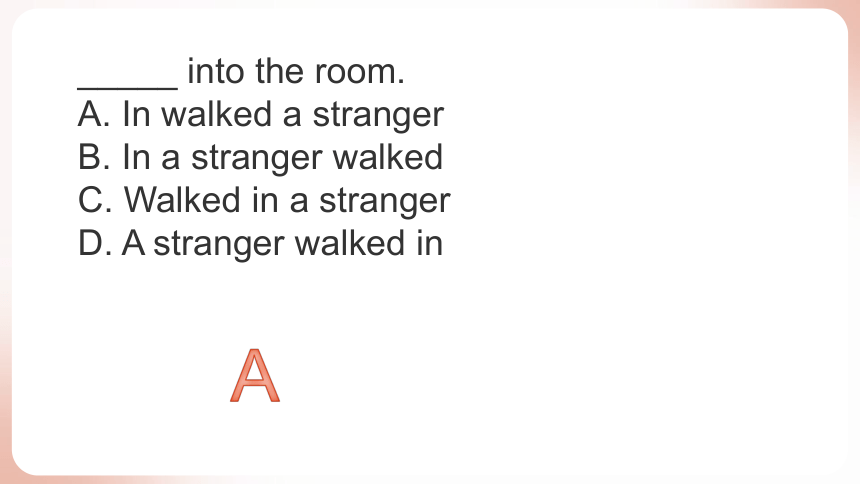
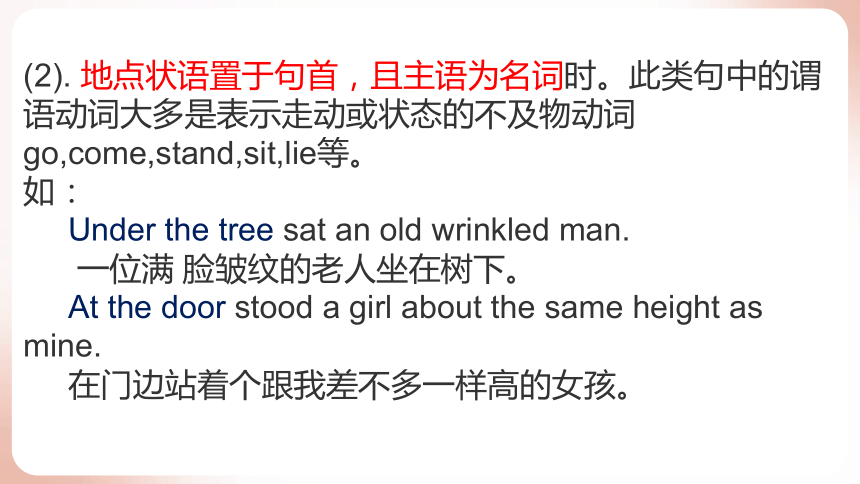
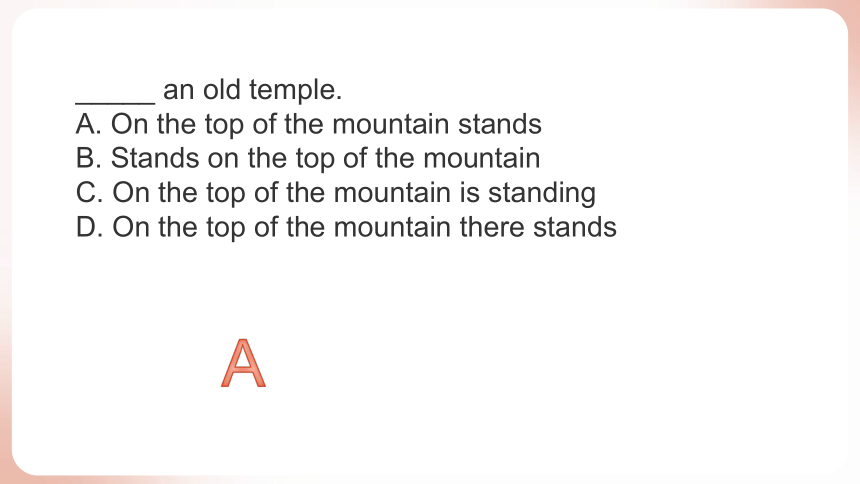
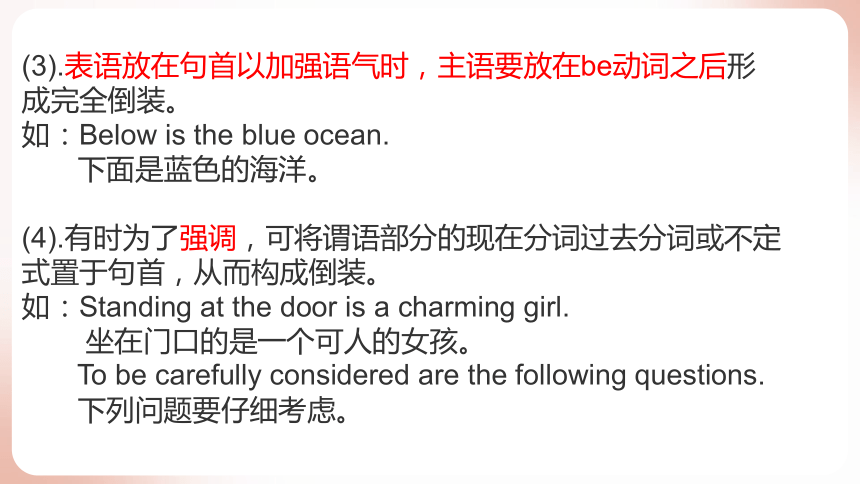
文档简介
(共27张PPT)
英语倒装句
Inversion
何为倒装?
倒装是一种语法现象,指在句子中故意颠倒常规的语序(主语在前,谓语在后),以达到强调、修饰或满足特定语法规则的目的,常见于疑问句、强调句、条件句或某些特殊结构中。
正常语序:主语+谓语+宾语
如:I love maths.
V.+主语+……
助动词/情态动词/系动词+主语+V.+……
完全倒装
定义:将整个谓语动词或整个谓语部分都放在主语前面时,称为完全倒装。
(1)以here,there,now,then,from,out,down,in,up,away,on等副词开头的句子,且谓语动词都 是属于表示移动的含义,主语为名词时。
如:
There followed a long silence.接着是一阵长时间的沉默。
Now come the long-awaited guests.盼望已久的客人们现在来了。
From the distance came occasional shots.从远处不时传来枪声。
Out rushed a tiger.一只老虎冲了出去。
*注意:如果上述情况中主语为代词,则句子不必倒装。
如:
Out he rushed.他冲了出去。
Here she came.她来了。
______ after the explosion.
A. Up went the smoke
B. Up the smoke went
C. Went up the smoke
D. The smoke went up
A
_____ into the room.
A. In walked a stranger
B. In a stranger walked
C. Walked in a stranger
D. A stranger walked in
A
(2). 地点状语置于句首,且主语为名词时。此类句中的谓语动词大多是表示走动或状态的不及物动词go,come,stand,sit,lie等。
如:
Under the tree sat an old wrinkled man.
一位满 脸皱纹的老人坐在树下。
At the door stood a girl about the same height as mine.
在门边站着个跟我差不多一样高的女孩。
_____ an old temple.
A. On the top of the mountain stands
B. Stands on the top of the mountain
C. On the top of the mountain is standing
D. On the top of the mountain there stands
A
(3).表语放在句首以加强语气时,主语要放在be动词之后形成完全倒装。
如:Below is the blue ocean.
下面是蓝色的海洋。
(4).有时为了强调,可将谓语部分的现在分词过去分词或不定式置于句首,从而构成倒装。
如:Standing at the door is a charming girl.
坐在门口的是一个可人的女孩。
To be carefully considered are the following questions.
下列问题要仔细考虑。
______ the answer to the question.
A. Obvious is
B. Is obvious
C. Obvious it is
D. It is obvious
______ the most famous scientist in the world.
A. Einstein was
B. Was Einstein
C. Einstein is
D. Is Einstein
B
D
结构:形容词表语 + is + 名词主语
注意:此题为疑问句,不是表语前置倒装。
部分倒装
只将助动词置于主语前,谓语其余部分置于主语后,则是部分倒装。
(1)否定词及含有否定意义的副词或词组置于句首时,句子要部分倒装: never,no,not,not only,hardly,scarcely,rarely,little,seldom,nowhere,no sooner..than,hardly/barely/scarcely…when,not until,at no time,by no means,on no account,in no way,in no case,on no condition,in/under no circumstances等。
如:In no way am I responsible for what has happened.
我决不会对已经发生的事负责。
No sooner had the bell rung than the students rushed out of the classroom.
铃声一响,学生 们就跑出了教室。
Little about her own safety,though she herself was in great danger.
A.she cared
B.she may care
C.may she care
D.did she care
D
译文:虽然深陷险境,但她一点也不在意自身的安全。
分析:以否定副词(如never,little,hardly,seldom等)开头的句子,必须把助动词或情态动词放在主 语之前,形成部分倒装。
在此句中,主语为第三人称单数过去时,助动词为do,所以最终提前的助动词 必须为did,因此答案为D。
.Never again ______ political office after his 1928 defeat for the presidency.
a. Alfred E. Smith seriously sought
b. seriously Alfred E. Smith sought
c. when did Alfred E. Smith seriously seek
d. did Alfred E. Smith seriously seek
D
关键词:Never,部分倒装
Not until I shouted at the top of my voice ______ his head.
a. that he turned
b. did he turn
c. he didn’t turn
d. he had turned
B
(2) 以only修饰状语开头的句子,要部分倒装。
如:
Only last week did they get married.
他们上个星期刚结婚。
Only if I get a job will I have enough money to get the camera.
我只有找到了工作才有足够的钱买那款相机。
*注意: only属干主语的一部分时不可用倒装结构。
如: Only a few people understood what he said.
只有很少人懂得他在说什么。
.Only when you have obtained sufficient data ______ come to a sound
conclusion.
A. can you
B. you can
C. would you
D. you would
A
关键词: Only, 部分倒装
Only in recent years ______ begun to realize that wild dogs, kept within
bounds, often do more good than harm.
a. people have
b. since people have
c. have people
d. people who have
C
(3)以下列副词或短语开头的句子句子要部分倒装: so,such,to such a degree,to such an extent, to such extremes,to such a point等。
如:
Such was the weather that I could not go out.
天气如此这般,我出不了门。
To such a degree did the story touch me that I took notes of it.
这个故事深深地打动了我, 于是我把它记了下来。
. ______ that they may eventually reduce the amount of labor needed on construction sites by 90 percent.
a. Such construction robots are clever
b. So clever the construction robots are
c. So clever are the construction robots
d. Such clever construction robots are
C
选项a “Such construction robots are clever” 是正常陈述句语序,“such” 修饰名词短语,不符合此处强调 “clever(聪明的,形容词 )” 程度且需倒装的语境;
选项b “So clever the construction robots are” 缺少倒装的助动词提前,不是正确倒装结构;
选项d “Such clever construction robots are” 同样是 “such” 修饰名词短语的正常语序,不符合要求。
“so + 形容词/副词 + be动词/助动词/情态动词 + 主语”这一倒装结构,用来强调程度
(4)句首为so,nor,neither等副词,表明前句说明的情况也适用于该句时,句子通常要部分倒装
如:
He didn't say anything.Nor/Neither did his assistant.
他什么都没说,他助手也没吭声。
People in Britain rest two days a week.So do Chinese.
英国人一周休息两天,中国人也一样。
*注意:当so放在句首只是对对方所陈述的内容表示肯定时,不用倒装。
如: "Tom wants to complete the important task."“So he does.”
“汤姆想完成那项重要的任务。”“他的确想。”
Heat does not travel by convection in solid, because the solid does not move, ______.
a. so does a liquid
b. so a liquid does
c. as does a liquid
d. so is a liquid
原句说热量在固体中不通过对流传递,因为固体不移动,“as does a liquid”是倒装结构,表“液体也一样(不移动,所以热量在液体中对流传递情况不同 )” ,所以选A.
C
“so does a liquid”用于肯定句表“……也一样”,原句前半是否定,不适用
结构错误
与原句动词“move”不匹配,原句是实义动词,不是be动词
(5) 虚拟条件句可以省略连词if.把从句中的助动词(were,should/could/might或had)移至主语前,形 成部分倒装。
如:
Had you been(=If you had been)here last night,you would have met her. 如果你昨晚来这 里的话,你就会见到她了。
Be any person(=If any person be)guilty of a crime,the court shall have the right to try. 任何人犯罪,法院都有权审判。
Were I you(=If I were you),I would go to look for him.
如果我是你,就会去找他。
虚拟条件句中省略 if 并使用倒装结构
基本规则:
在虚拟条件句中,如果省略连词 if,需将从句中的助动词 (were, had, should/could/might) 提前至主语前,形成 部分倒装。
结构对比:
正常语序(带 if): 倒装语序(省略 if):
If I were you, I would study harder. Were I you, I would study harder.
If he had come earlier, he would have met her. Had he come earlier, he would have met her.
If it should rain tomorrow, we would cancel the trip. Should it rain tomorrow, we would cancel the trip.
三种虚拟语气的倒装形式
虚拟类型 正常语序(带 if) 倒装语序(省略 if)
与现在相反 If I were free... Were I free...
与过去相反 If he had known... Had he known...
与将来相反 If it should snow... Should it snow...
将下列虚拟条件句改为倒装结构(省略 if):
If I were you, I would apologize.
→ Were I you, I would apologize.
If he had studied harder, he would have passed.
→ Had he studied harder, he would have passed.
If she should call, tell her I’m busy.
→ Should she call, tell her I’m busy.
If it were not for your help, I would fail.
→ Were it not for your help, I would fail.
If they had not missed the train, they would be here now.
→ Had they not missed the train, they would be here now.
1. ______, I would forgive him.
A. If he apologized
B. Were he to apologize
C. He should apologize
D. If he would apologize
2. ______ earlier, he wouldn’t have missed the meeting.
A. Had he left
B. If he left
C. Did he leave
D. If he had been left
3.______ the truth, he wouldn’t have been so angry.
A. Had he known
B. If he knows
C. Did he know
D. If he had been known
B
A
A
A 是正常 if 从句,但主句是虚拟(would forgive),从句也应用虚拟(were to apologize)。 C 和 D 结构错误。
与过去事实相反,需用 "had + 过去分词" 倒装。B、C、D 结构错误。
A与过去事实相反,倒装结构正确。B、C、D 结构或时态错误。
(6) as和though引导的让步状语从句通常用倒装结构, as必须用倒装结构, though可用也可不用倒装。这种倒装通常是把从句中的表语、状语或谓语动词放在句首。
如:
Small as it is,an atom can still be seen.
虽然小,原子还是能被看见。
Sick as/though she was,she came to work.
尽管她病了,她还是来上班了。
______, she refused to give up.
A. Though she was tired
B. Tired though she was
C. As tired she was
D. Both A and B
D
though 可倒装可不倒装,A、B 都正确,C 语序错误。
______, I still don’t agree with his decision.
A. Much as I respect him
B. As much I respect him
C. Though I respect him much
D. I respect him as much
A
Much as I respect him = Although I respect him much)
程度副词(much/very)提前需用 as,B、C 语序错误,D 不是从句。
Thank you
英语倒装句
Inversion
何为倒装?
倒装是一种语法现象,指在句子中故意颠倒常规的语序(主语在前,谓语在后),以达到强调、修饰或满足特定语法规则的目的,常见于疑问句、强调句、条件句或某些特殊结构中。
正常语序:主语+谓语+宾语
如:I love maths.
V.+主语+……
助动词/情态动词/系动词+主语+V.+……
完全倒装
定义:将整个谓语动词或整个谓语部分都放在主语前面时,称为完全倒装。
(1)以here,there,now,then,from,out,down,in,up,away,on等副词开头的句子,且谓语动词都 是属于表示移动的含义,主语为名词时。
如:
There followed a long silence.接着是一阵长时间的沉默。
Now come the long-awaited guests.盼望已久的客人们现在来了。
From the distance came occasional shots.从远处不时传来枪声。
Out rushed a tiger.一只老虎冲了出去。
*注意:如果上述情况中主语为代词,则句子不必倒装。
如:
Out he rushed.他冲了出去。
Here she came.她来了。
______ after the explosion.
A. Up went the smoke
B. Up the smoke went
C. Went up the smoke
D. The smoke went up
A
_____ into the room.
A. In walked a stranger
B. In a stranger walked
C. Walked in a stranger
D. A stranger walked in
A
(2). 地点状语置于句首,且主语为名词时。此类句中的谓语动词大多是表示走动或状态的不及物动词go,come,stand,sit,lie等。
如:
Under the tree sat an old wrinkled man.
一位满 脸皱纹的老人坐在树下。
At the door stood a girl about the same height as mine.
在门边站着个跟我差不多一样高的女孩。
_____ an old temple.
A. On the top of the mountain stands
B. Stands on the top of the mountain
C. On the top of the mountain is standing
D. On the top of the mountain there stands
A
(3).表语放在句首以加强语气时,主语要放在be动词之后形成完全倒装。
如:Below is the blue ocean.
下面是蓝色的海洋。
(4).有时为了强调,可将谓语部分的现在分词过去分词或不定式置于句首,从而构成倒装。
如:Standing at the door is a charming girl.
坐在门口的是一个可人的女孩。
To be carefully considered are the following questions.
下列问题要仔细考虑。
______ the answer to the question.
A. Obvious is
B. Is obvious
C. Obvious it is
D. It is obvious
______ the most famous scientist in the world.
A. Einstein was
B. Was Einstein
C. Einstein is
D. Is Einstein
B
D
结构:形容词表语 + is + 名词主语
注意:此题为疑问句,不是表语前置倒装。
部分倒装
只将助动词置于主语前,谓语其余部分置于主语后,则是部分倒装。
(1)否定词及含有否定意义的副词或词组置于句首时,句子要部分倒装: never,no,not,not only,hardly,scarcely,rarely,little,seldom,nowhere,no sooner..than,hardly/barely/scarcely…when,not until,at no time,by no means,on no account,in no way,in no case,on no condition,in/under no circumstances等。
如:In no way am I responsible for what has happened.
我决不会对已经发生的事负责。
No sooner had the bell rung than the students rushed out of the classroom.
铃声一响,学生 们就跑出了教室。
Little about her own safety,though she herself was in great danger.
A.she cared
B.she may care
C.may she care
D.did she care
D
译文:虽然深陷险境,但她一点也不在意自身的安全。
分析:以否定副词(如never,little,hardly,seldom等)开头的句子,必须把助动词或情态动词放在主 语之前,形成部分倒装。
在此句中,主语为第三人称单数过去时,助动词为do,所以最终提前的助动词 必须为did,因此答案为D。
.Never again ______ political office after his 1928 defeat for the presidency.
a. Alfred E. Smith seriously sought
b. seriously Alfred E. Smith sought
c. when did Alfred E. Smith seriously seek
d. did Alfred E. Smith seriously seek
D
关键词:Never,部分倒装
Not until I shouted at the top of my voice ______ his head.
a. that he turned
b. did he turn
c. he didn’t turn
d. he had turned
B
(2) 以only修饰状语开头的句子,要部分倒装。
如:
Only last week did they get married.
他们上个星期刚结婚。
Only if I get a job will I have enough money to get the camera.
我只有找到了工作才有足够的钱买那款相机。
*注意: only属干主语的一部分时不可用倒装结构。
如: Only a few people understood what he said.
只有很少人懂得他在说什么。
.Only when you have obtained sufficient data ______ come to a sound
conclusion.
A. can you
B. you can
C. would you
D. you would
A
关键词: Only, 部分倒装
Only in recent years ______ begun to realize that wild dogs, kept within
bounds, often do more good than harm.
a. people have
b. since people have
c. have people
d. people who have
C
(3)以下列副词或短语开头的句子句子要部分倒装: so,such,to such a degree,to such an extent, to such extremes,to such a point等。
如:
Such was the weather that I could not go out.
天气如此这般,我出不了门。
To such a degree did the story touch me that I took notes of it.
这个故事深深地打动了我, 于是我把它记了下来。
. ______ that they may eventually reduce the amount of labor needed on construction sites by 90 percent.
a. Such construction robots are clever
b. So clever the construction robots are
c. So clever are the construction robots
d. Such clever construction robots are
C
选项a “Such construction robots are clever” 是正常陈述句语序,“such” 修饰名词短语,不符合此处强调 “clever(聪明的,形容词 )” 程度且需倒装的语境;
选项b “So clever the construction robots are” 缺少倒装的助动词提前,不是正确倒装结构;
选项d “Such clever construction robots are” 同样是 “such” 修饰名词短语的正常语序,不符合要求。
“so + 形容词/副词 + be动词/助动词/情态动词 + 主语”这一倒装结构,用来强调程度
(4)句首为so,nor,neither等副词,表明前句说明的情况也适用于该句时,句子通常要部分倒装
如:
He didn't say anything.Nor/Neither did his assistant.
他什么都没说,他助手也没吭声。
People in Britain rest two days a week.So do Chinese.
英国人一周休息两天,中国人也一样。
*注意:当so放在句首只是对对方所陈述的内容表示肯定时,不用倒装。
如: "Tom wants to complete the important task."“So he does.”
“汤姆想完成那项重要的任务。”“他的确想。”
Heat does not travel by convection in solid, because the solid does not move, ______.
a. so does a liquid
b. so a liquid does
c. as does a liquid
d. so is a liquid
原句说热量在固体中不通过对流传递,因为固体不移动,“as does a liquid”是倒装结构,表“液体也一样(不移动,所以热量在液体中对流传递情况不同 )” ,所以选A.
C
“so does a liquid”用于肯定句表“……也一样”,原句前半是否定,不适用
结构错误
与原句动词“move”不匹配,原句是实义动词,不是be动词
(5) 虚拟条件句可以省略连词if.把从句中的助动词(were,should/could/might或had)移至主语前,形 成部分倒装。
如:
Had you been(=If you had been)here last night,you would have met her. 如果你昨晚来这 里的话,你就会见到她了。
Be any person(=If any person be)guilty of a crime,the court shall have the right to try. 任何人犯罪,法院都有权审判。
Were I you(=If I were you),I would go to look for him.
如果我是你,就会去找他。
虚拟条件句中省略 if 并使用倒装结构
基本规则:
在虚拟条件句中,如果省略连词 if,需将从句中的助动词 (were, had, should/could/might) 提前至主语前,形成 部分倒装。
结构对比:
正常语序(带 if): 倒装语序(省略 if):
If I were you, I would study harder. Were I you, I would study harder.
If he had come earlier, he would have met her. Had he come earlier, he would have met her.
If it should rain tomorrow, we would cancel the trip. Should it rain tomorrow, we would cancel the trip.
三种虚拟语气的倒装形式
虚拟类型 正常语序(带 if) 倒装语序(省略 if)
与现在相反 If I were free... Were I free...
与过去相反 If he had known... Had he known...
与将来相反 If it should snow... Should it snow...
将下列虚拟条件句改为倒装结构(省略 if):
If I were you, I would apologize.
→ Were I you, I would apologize.
If he had studied harder, he would have passed.
→ Had he studied harder, he would have passed.
If she should call, tell her I’m busy.
→ Should she call, tell her I’m busy.
If it were not for your help, I would fail.
→ Were it not for your help, I would fail.
If they had not missed the train, they would be here now.
→ Had they not missed the train, they would be here now.
1. ______, I would forgive him.
A. If he apologized
B. Were he to apologize
C. He should apologize
D. If he would apologize
2. ______ earlier, he wouldn’t have missed the meeting.
A. Had he left
B. If he left
C. Did he leave
D. If he had been left
3.______ the truth, he wouldn’t have been so angry.
A. Had he known
B. If he knows
C. Did he know
D. If he had been known
B
A
A
A 是正常 if 从句,但主句是虚拟(would forgive),从句也应用虚拟(were to apologize)。 C 和 D 结构错误。
与过去事实相反,需用 "had + 过去分词" 倒装。B、C、D 结构错误。
A与过去事实相反,倒装结构正确。B、C、D 结构或时态错误。
(6) as和though引导的让步状语从句通常用倒装结构, as必须用倒装结构, though可用也可不用倒装。这种倒装通常是把从句中的表语、状语或谓语动词放在句首。
如:
Small as it is,an atom can still be seen.
虽然小,原子还是能被看见。
Sick as/though she was,she came to work.
尽管她病了,她还是来上班了。
______, she refused to give up.
A. Though she was tired
B. Tired though she was
C. As tired she was
D. Both A and B
D
though 可倒装可不倒装,A、B 都正确,C 语序错误。
______, I still don’t agree with his decision.
A. Much as I respect him
B. As much I respect him
C. Though I respect him much
D. I respect him as much
A
Much as I respect him = Although I respect him much)
程度副词(much/very)提前需用 as,B、C 语序错误,D 不是从句。
Thank you
